|
|
|
Sort Order |
|
|
|
Items / Page
|
|
|
|
|
|
|
| Srl | Item |
| 1 |
ID:
168261
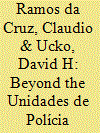

|
|
|
|
|
| Summary/Abstract |
Ten years ago, in 2008, the Brazilian Government adopted a strategy to regain control over the favelas in Rio de Janeiro – the Pacifying Police Units (UPP). In spite of initial favorable results, the main threat, namely the Red Command (CV), fought back and by 2014 the UPP strategy was badly frayed. In order to defeat this threat, it is necessary to reconceptualize CV as a criminal insurgency and to pinpoint and address the social and political factors that sustain it. This allows for a response inspired by the ‘shape-clear-hold-build’ counterinsurgency approach, which while cost-intensive is, in the long term, the most sustainable path to achieving security within the favelas and integrating these neglected areas within the broader city of Rio de Janeiro.
|
|
|
|
|
|
|
|
|
|
|
|
|
|
|
|
| 2 |
ID:
148222
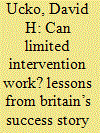

|
|
|
|
|
| Summary/Abstract |
Following frustrating campaigns in Iraq and Afghanistan, Western interventions are becoming more limited, with troops being deployed for short bursts and residual peace-building tasks being left to others. Although this approach limits exposure for the intervening government, it struggles to achieve meaningful political change. Examining the comparatively successful British intervention in Sierra Leone (2000–02), this article identifies the conditions for effectiveness in these campaigns. It challenges the historiography of the case by framing armed confrontations and raids as enablers of politics rather than ends in themselves; indeed, in both the conduct and study of intervention, politics must reign supreme.
|
|
|
|
|
|
|
|
|
|
|
|
|
|
|
|
| 3 |
ID:
164294
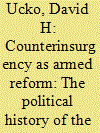

|
|
|
|
|
| Summary/Abstract |
Despite the emphasis in doctrine and academia that counterinsurgency is in its essence political, these operations are all too commonly discussed and approached as primarily military endeavors. Informed by the need to refocus counterinsurgency studies, this article revisits a foundational case of the canon – the Malayan Emergency – to discuss its political (i.e., not military) unfolding. The analysis distinguishes itself by emphasizing the diplomatic processes, negotiations, and deals that gave strategic meaning to the military operations underway. In so doing, the article also generates insight on the use of leverage and elite bargains in creating new political settlements and bringing insurgent conflicts to an end.
|
|
|
|
|
|
|
|
|
|
|
|
|
|
|
|
| 4 |
ID:
193168
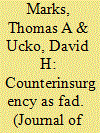

|
|
|
|
|
| Summary/Abstract |
The counterinsurgency era that dominated American military discussion post-9/11 has passed. The desire to move on, particularly since the loss of Afghanistan in August 2021, has left unsettled a conversation on counterinsurgency that, both among supporters and detractors, was often dangerously narrow. Too hastily embraced and too rapidly abandoned, counterinsurgency generated false promises and then became the scapegoat for poor strategy. This article examines the counterinsurgency era that was and demonstrates how fad-like engagement with the topic in both military and academic circles subverted the supposed learning process taking place. It argues that the lessons from this engagement are mostly misleading or at least incomplete, but it also notes that there is minimal appetite to look deeper into a topic now deemed toxic. Therein lies significant danger.
|
|
|
|
|
|
|
|
|
|
|
|
|
|
|
|
| 5 |
ID:
128228
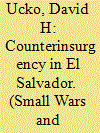

|
|
|
|
|
| Publication |
2013.
|
| Summary/Abstract |
Following two frustrating counterinsurgency campaigns in Iraq and Afghanistan, there is a drive to find new and more viable ways of addressing irregular security challenges. In this effort, the 1980s' campaign in El Salvador has gained prominence, as it resulted in the defeat of the guerrilla adversary yet involved only a modest deployment of US personnel and resources. The use of history to search for models and precedents can be fruitful, but past conflicts must be understood on their own terms and not made to fit the preconceived ideas of the day. A deeper appreciation of what happened in El Salvador reveals not only the unique circumstances that shaped the campaign but also the limited results of the counterinsurgency program to which the war's outcome is now being ascribed. This article adopts a broader lens, focusing on the real yet undervalued factors that produced peace in El Salvador and whether the final outcome was truly quite as successful as is now commonly assumed.
|
|
|
|
|
|
|
|
|
|
|
|
|
|
|
|
| 6 |
ID:
131470
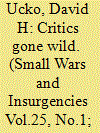

|
|
|
|
|
| Publication |
2014.
|
| Summary/Abstract |
The Western interventions in Iraq and Afghanistan have produced a heated polemic concerning the merits and demerits of counterinsurgency - the operational approach underpinning both campaigns. The two books reviewed here provide a good summation of the arguments against counterinsurgency: it is not a strategy and will fail when mistaken as such; its theory does not make intervention and war significantly easier; and even the most successful counterinsurgency campaigns have been bloody, violent, and protracted. Yet as this review highlights, beyond these central points, criticism of counterinsurgency is too often off the mark in its approach and totalizing in its pretentions. There is much to criticize and an urgent need to learn from past campaigns, yet bold claims and broad generalizations can mislead rather than enlighten. The analysis is particularly unhelpful when the definition of the central issue at hand - counterinsurgency - is being unwittingly or deliberately distorted. In the end, these two books form a poor basis for the debate that must now take place, because they are too ideological in tone, too undisciplined in approach, and therefore too unqualified in what they finally say.
|
|
|
|
|
|
|
|
|
|
|
|
|
|
|
|
| 7 |
ID:
122257
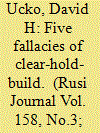

|
|
|
|
|
| Publication |
2013.
|
| Summary/Abstract |
Central to the counter-insurgency campaigns conducted in Iraq and Afghanistan over the last decade has been the concept of 'clear-hold-build' - the notion that government legitimacy can be spread like ink across a page by, first, clearing an area of insurgents; second, holding that area securely; and, third, building infrastructure and undertaking local development projects. In this article, David H Ucko explores five fallacies surrounding the concept to show that it cannot be applied indiscriminately. Instead, it needs to take account of the individual features of each locality, each village - because the page is rarely blank before the ink is applied.
|
|
|
|
|
|
|
|
|
|
|
|
|
|
|
|
| 8 |
ID:
178551
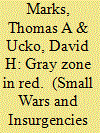

|
|
|
|
|
| Summary/Abstract |
With the United States having shifted its defense emphasis to peer and near-peer rivals, study of irregular warfare has likewise expanded its scope to applicable lessons for the strategic level, within the context of great-power competition. In theory, meanwhile, concern for sub-state actors remains an integral mission for the Department of Defense (DoD), with formal tasking issued to integrate into joint professional military education (JPME) the insights drawn from the last two decades of commitment. The resulting synthesis has led to a discussion of what has variously been termed gray zone conflict, hybrid war, or political warfare.
|
|
|
|
|
|
|
|
|
|
|
|
|
|
|
|
| 9 |
ID:
124439
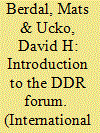

|
|
|
|
|
| Publication |
2013.
|
| Summary/Abstract |
Over the past two decades, international efforts to support the socio-economic adjustment of ex-combatants to the uncertain and often messy realities of postwar situations, have presented donor countries, NGOs and international organizations with complex, often formidable, institutional and logistical challenges. Many of these have been exhaustively and often expertly covered in the still burgeoning literature on disarmament, demobilization and reintegration (DDR). While they continue to merit scholarly and policy attention, the underlying focus of this special issue of International Peacekeeping is less on what we in the past have referred to as the mechanics of DDR - that is, how best to plan, organize, coordinate and fund DDR activities - than on the context and politics of reintegrating ex-combatants following protracted periods of armed conflict and civil war.
|
|
|
|
|
|
|
|
|
|
|
|
|
|
|
|
| 10 |
ID:
132422
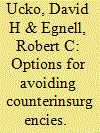

|
|
|
| 11 |
ID:
100939
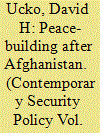

|
|
|
|
|
| Publication |
2010.
|
| Summary/Abstract |
Engagement in various forms of peace-building has increased dramatically since the Cold War, yet what is the future of peace-building in the aftermath of the troubled intervention in Afghanistan? This article argues that while many Western and allied governments will feel chastened by the experience in Central Asia, their impulse to 'do good' internationally will not altogether disappear. Instead, to avoid manage the complexity of future interventions, intervening government may be tempted to reinvoke the traditional peace-building principles drawn from the 1990s - neutrality, consent-based operations, and the minimum use of force. Such a tendency, this article argues, is based on a flawed historical understanding of the experiences of the 1990s and underestimates what it takes to build peace after war. Dissecting the peace-building principles in light of more recent experiences with counterinsurgency, the article explores the full requirements for effective intervention in war-to-peace transitions. It then concludes by discussing what these requirements mean for those states that express interest in peace-building, but whose commitment and capabilities are often found lacking.
|
|
|
|
|
|
|
|
|
|
|
|
|
|
|
|
| 12 |
ID:
143635
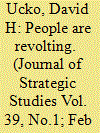

|
|
|
|
|
| Summary/Abstract |
Rather than win hearts and minds, authoritarian counterinsurgency is said to rely heavily on coercion. It has a reputation for effectiveness, if also for its amorality. Still, the research into authoritarian counterinsurgency is surprisingly lacking. By distilling common features from key cases, this article concludes that this approach goes beyond the indiscriminate violence that typically captures the imagination. Like their democratic counterparts but differently, authoritarian regimes also engage in mobilisation, create narratives, and turn military advantage into political gain. The analysis explains how these tasks are undertaken and, by contradistinction, sheds light on more liberal approaches as well.
|
|
|
|
|
|
|
|
|
|
|
|
|
|
|
|
| 13 |
ID:
158717
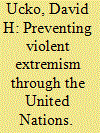

|
|
|
|
|
| Summary/Abstract |
In January 2016, late in his term as Secretary-General, Ban Ki-moon introduced a Plan of Action to Prevent Violent Extremism (PVE). The approach promised to bring balance to multilateral counterterrorism by adding much-needed focus on the drivers of mobilization into violence. Highly arguable in theory and with great potential against the online recruitment efforts of groups such as Islamic State in Iraq and Syria, the PVE agenda has nonetheless found enemies at the United Nations—both among member states and within the Secretariat. Errors committed in the Plan of Action's rollout made the new approach hostage to the very limitations and tensions that it was intended to resolve. PVE also rests on a shaky conceptual foundation and has been further stultified by the intensely political setting in which it was to be implemented. The future of this well-intended approach therefore looks at risk, even bleak. This article traces and explains the rise and likely fall of PVE at the United Nations, bringing to light a number of sobering insight into the possibilities and limits of multilateral counterterrorism.
|
|
|
|
|
|
|
|
|
|
|
|
|
|
|
|
| 14 |
ID:
091619
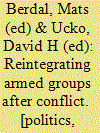

|
|
|
|
|
| Publication |
Milton Park, Routledge, 2009.
|
| Description |
xiv, 226 p. : ill.Hardbound
|
| Contents |
Includes bibliographical references and index.
|
| Standard Number |
9780415476652
|
|
|
|
|
|
|
|
|
|
|
|
Copies: C:1/I:0,R:0,Q:0
Circulation
| Accession# | Call# | Current Location | Status | Policy | Location |
| 054520 | 327.172/BER 054520 | Main | On Shelf | General | |
|
|
|
|
| 15 |
ID:
165190
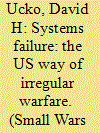

|
|
|
|
|
| Summary/Abstract |
Since 9/11, the United States has achieved notable gains against al Qaeda, and also Islamic State (IS), all while avoiding another mass-casualty attack at home. Yet, institutionally, culturally, and in its capabilities, the US government remains seriously ill-equipped for the task of countering irregular threats. Partly as a result, Islamist extremism shows no sign of being defeated, having instead metastasized since 9/11 and spread. Why, given the importance accorded to counterterrorism, has the US approach remained inadequate? What is impeding more fundamental reforms? The article evaluates the United States’ way of irregular warfare: its troubled engagement with counterinsurgency and its problematic search for lower cost and lower risk ways of combating terrorism. It suggests needed reforms but acknowledges also the unlikelihood of change.
|
|
|
|
|
|
|
|
|
|
|
|
|
|
|
|
| 16 |
ID:
096507
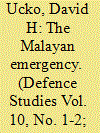

|
|
|
| 17 |
ID:
134387
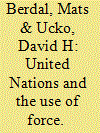

|
|
|
|
|
| Summary/Abstract |
When, in An Agenda for Peace of June 1992, Boutros Boutros-Ghali set
out his vision for a revitalised UN after the Cold War, he offered a
definition of UN ‘peacekeeping’ in which the insertion of one innocentsounding
word appeared to herald a new era. ‘Peace-keeping’, the UN
secretary general probingly stated, ‘is the deployment of a UN presence
in the field, hitherto with the consent of all the parties concerned’.
Catching the attention of UN officials, academics and governments at
the time, the reference to ‘hitherto’ was deemed highly significant. It
seemed to imply that the tried and tested principles of UN peacekeeping
– its reliance on the principles of consent, impartiality and minimum use
of force except in self-defence – might now, in the post-Cold War era,
give way to a more expansive role for UN military forces, one that
would likely involve taking the initiative in the use of force.
|
|
|
|
|
|
|
|
|
|
|
|
|
|
|
|
| 18 |
ID:
138429
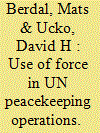

|
|
|
|
|
| Summary/Abstract |
Although the demand for UN peacekeepers shows little sign of abating, a sense of uncertainty and malaise continues to colour discussions about the future of UN peacekeeping. Of the many issues facing the UN High-Level Independent Panel on Peace Operations that was set up in 2014, the use of force by UN peacekeepers is likely to attract particular attention. It is also likely to prove divisive, both among member states and within the Secretariat. While steps can be taken to strengthen the capacity of the UN to mount and conduct field operations, Mats Berdal and David H Ucko argue that the way forward does not lie simply in entrusting UN forces with ever-more ‘robust’ war-fighting mandates. Instead, more systematic attention needs to be given to strategically linking UN peacekeeping activities to political processes aimed at bringing violent conflict to an end. This will require far greater honesty from member states regarding their own responsibility in enabling the UN to do what they ask of it.
|
|
|
|
|
|
|
|
|
|
|
|
|
|
|
|
| 19 |
ID:
159148
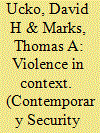

|
|
|
|
|
| Summary/Abstract |
The malaise that the United States, and the West, have experienced in recent campaigns stems in large part from unclear thinking about war, its political essence, and the strategies needed to join the two. Instead, analysis and response are predicated on entrenched theoretical concepts with limited practical utility. The inadequacy of understanding has spawned new, and not so new, terms to capture unanticipated trends, starting with the re-discovery of “insurgency” and “counterinsurgency” and leading to discussion of “hybrid threats” and “gray-zone” operations. New terminology can help, but the change must go deeper. Challenging analytical orthodoxy, this article sets out a unifying approach for the study of political violence, or more accurately: violent politics. It provides a conceptual foundation that helps to make sense of recent shifts in warfare. In effect, it offers sorely needed theoretical insights into the nature of strategy and guides the process of responding to nontraditional threats.
|
|
|
|
|
|
|
|
|
|
|
|
|
|
|
|
|
|
|
|
|